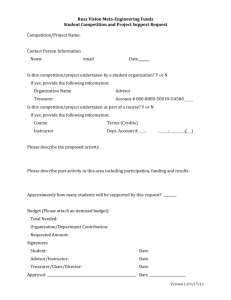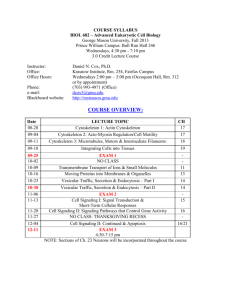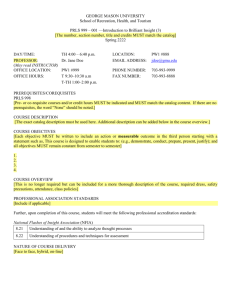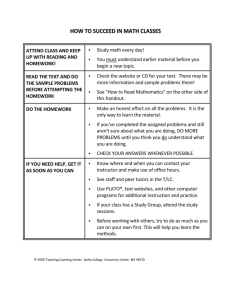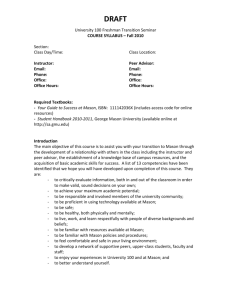George Mason University University 100 First Year Seminar Course
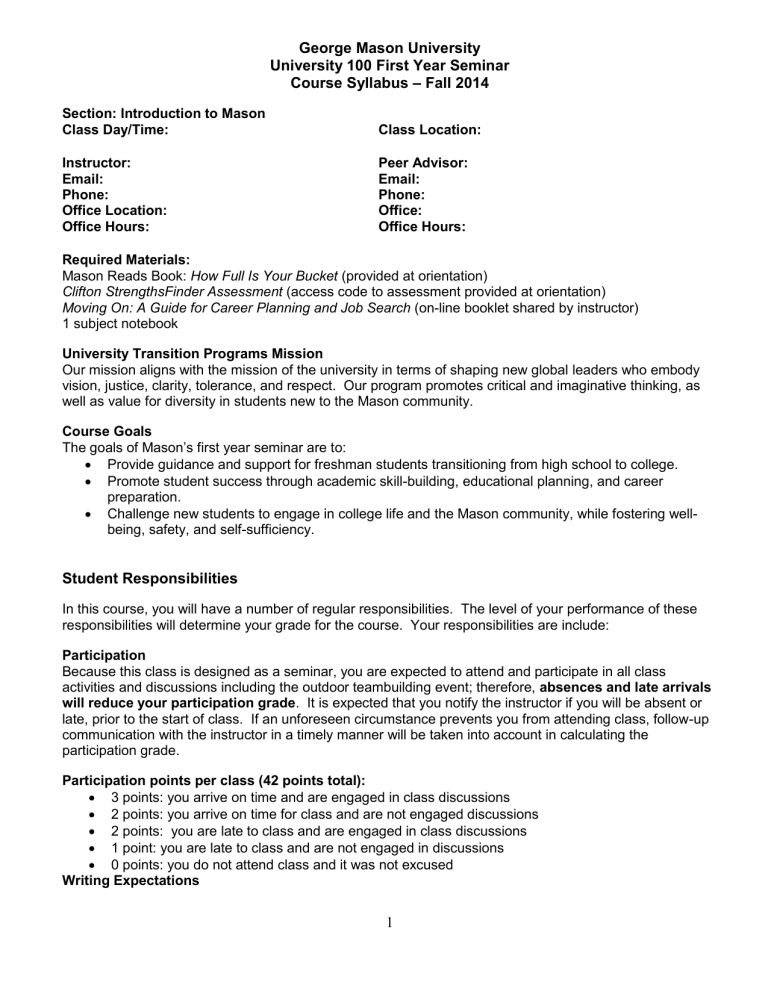
Section: Introduction to Mason
Class Day/Time:
George Mason University
University 100 First Year Seminar
Course Syllabus – Fall 2014
Class Location:
Instructor:
Email:
Phone:
Office Location:
Office Hours:
Peer Advisor:
Email:
Phone:
Office:
Office Hours:
Required Materials:
Mason Reads Book: How Full Is Your Bucket (provided at orientation)
Clifton StrengthsFinder Assessment (access code to assessment provided at orientation)
Moving On: A Guide for Career Planning and Job Search (on-line booklet shared by instructor)
1 subject notebook
University Transition Programs Mission
Our mission aligns with the mission of the university in terms of shaping new global leaders who embody vision, justice, clarity, tolerance, and respect. Our program promotes critical and imaginative thinking, as well as value for diversity in students new to the Mason community.
Course Goals
The goals of Mason’s first year seminar are to:
Provide guidance and support for freshman students transitioning from high school to college.
Promote student success through academic skill-building, educational planning, and career preparation.
Challenge new students to engage in college life and the Mason community, while fostering wellbeing, safety, and self-sufficiency.
Student Responsibilities
In this course, you will have a number of regular responsibilities. The level of your performance of these responsibilities will determine your grade for the course. Your responsibilities are include:
Participation
Because this class is designed as a seminar, you are expected to attend and participate in all class activities and discussions including the outdoor teambuilding event; therefore, absences and late arrivals will reduce your participation grade . It is expected that you notify the instructor if you will be absent or late, prior to the start of class. If an unforeseen circumstance prevents you from attending class, follow-up communication with the instructor in a timely manner will be taken into account in calculating the participation grade.
Participation points per class (42 points total):
3 points: you arrive on time and are engaged in class discussions
2 points: you arrive on time for class and are not engaged discussions
2 points: you are late to class and are engaged in class discussions
1 point: you are late to class and are not engaged in discussions
0 points: you do not attend class and it was not excused
Writing Expectations
1
All assignments should be double-spaced typed in a standard size 12 font with normal margins.
Assignments should be proofread for grammar and errors. Page length will vary based on specific assignment. All assignments should be submitted electronically via Blackboard prior to the class meeting on the due date.
Journals (2 points each)
Several times throughout the semester, you will be assigned a topic to write about in the form of a journal.
Each journal should be a clear and concise reflection of your person al involvement in that week’s topic of discussion. Each journal will be evaluated on completeness and effort, not content. You should submit your journals electronically to both the instructor and peer advisor before the beginning of the next class, unless otherwise instructed. Journals should be approximately one double-spaced page in length, with attention to grammar and proofread for errors.
Teambuilding Event Reflection Paper (3 points)
As part of the University 100 experience, our class will participate in a teambuilding event in class during the semester. We will engage in problem-solving activities and team-oriented challenges. Following the event you will write a 2-page paper reflecting on your experience with your classmates and perspectives it creates for you in relation to going forward in your college career.
Beacon Assignment (5 points)
Students will need to take the survey that launches in late September and fill out the Beacon worksheet
(provided by your instructor) in response to the results of the survey
Academic Advisor Meeting and Form (5 points)
Meeting with your academic advisor on a regular basis is a crucial part of your college experience.
Advisors can assist you with a variety of different issues like deciding on major, selecting courses, finding an internship, and many other things. You are required to schedule at least one meeting with your advisor in October or November, before you register for spring classes and fill out the worksheet provided by your instructor.
Outside Event Reflection Papers (4 points each)
To broaden your knowledge of campus resources and activities, you are required to attend three Mason community events outside of the classroom during the semester. One should be academically-based , one cultural or performance-based , and one related to a student organization on campus. Your grade for each outside event will be based on a reflection paper summarizing of the event and a reflection of what meaning it held for you. One of these events must be connected to Mason Reads ( How Full is Your
Bucket ).
Outside events must be approved by faculty or PA prior to attending, you may submit your proposed outside events via (e-mail, blackboard, in class).
Outside Event #1 reflection paper due:
Outside Event #2 reflection paper due:
Outside Event #3 reflection paper due:
Resume (5 points)
Creating a resume your first year of college will help you see what skills and experience you already have and what areas you need to grow in. Resumes should be 1 page. For extra credit please visit University
Career Services.
Meeting with Faculty and/or Peer Advisor (3 points)
Talking with your Peer Advisor or Faculty on a regular basis can really help you in your adjustment to college life at
Mason. During mid-semester you will sign up for a meeting with your faculty and/or PA.
Final Assignment (15 points)
2
You will work individually or in pairs to prepare a 10-minute creative and personalized presentation on the theme, “Beyond the First Semester – Making the Most of My College Experience.” The presentation should include important plans and goals for your college experience going forward, based on the topics studied in class. You will also individually prepare a 2-page paper in which you summarize your specific plans and goals for next semester and beyond.
Grading
Your grade for the course will be based on the assignments and points listed below:
Points
Class Participation
Journals
Teambuilding Event Paper
42 - 3 points per class
10
3
– 2 points for each of 5 entries
Beacon Assignment/Worksheet
Academic Advisor Meeting Form
5
5
Outside Event Essays
Resume
12 - 4 points for each of 3 essays
5
Meeting with Faculty or PA 3
Final Assignment 15
100 total points
Grading Scale
A+ 100
A 99-94
A- 93-90
B+
B
B-
89-87
86-84
83-80
C+
C
C-
79-77
76-74
73-70
D
F
69-60
Below 60
Mid-Semester Progress Evaluation Report
Between September 22 and October 17 , you will receive a mid-semester evaluation. This evaluation will indicate your grade in the course thus far and specifically note any issues that are adversely affecting your grade. At any time during the semester, please feel free to see the instructor and/or peer advisor to discuss any challenges that you may be experiencing.
Extra credit opportunities, can be discussed with the instructor after mid-semester evaluations.
Class Policies and Resources
Late Work: Assignments will not be accepted late. This policy will be strictly enforced. In the event of an unusual and dire emergency, contact the instructor and peer advisor before an assignment is due or shortly thereafter. You may be required to provide evidence of your emergency in order to be considered for alternative accommodations.
Open Door Policy: Both the instructor and peer advisor are open to your comments, suggestions, and feedback on the course at any time. Feel free to email the instructor and/or peer advisor or see them before or after class to discuss your ideas and concerns. You may also submit your thoughts anonymously.
Learning Services (within Counseling and Psychological Services) offers academic skills and selfdevelopment workshops throughout the semester. For more information, call (703) 993-2999 or go to
3
caps.gmu.edu/learningservices. Attending one of these workshops can be counted towards an Outside
Event, with proper registration and verification.
Students with Disabilities: If you are a student with a disability and you need academic accommodations, please let your instructor and peer advisor know at the first class meeting.
All academic accommodations for students with disabilities must be arranged through the Office for Disability
Services, (703) 993-2474 or ods.gmu.edu.
Food and Drink: You may bring drinks and small snacks to class, however meals will not be permitted.
Please be courteous with extraneous noises or smells associated with what you bring to class. The instructors retain the right to rescind this policy if it is violated or becomes problematic.
Technology
The use of computers, translation devices, smartphones, and social media is a privilege that comes great responsibility. Gadgets should not distract you from earning your participation points or distract your classmates. Absolutely no gadgets should be out during guest speakers.
Emergency Procedures (Coming Soon) – Information about evacuating the classroom/building in the case of an emergency.
Syllabus: You should consider this syllabus as your contract for the course. You must follow the directions for each assignment and ensure that you submit your work on time. This class can be successfully completed if you manage your time effectively, come to class prepared, and turn in work in a timely and high quality fashion. These are behaviors that will enable you to be academically successful in your other classes as well.
University 100 Course Schedule: A course schedule is attached. Note that unforeseen circumstances may cause changes to the schedule, but you will be notified of changes accordingly. Assignment due dates are detailed on the course schedule. If class is canceled for some reason, you are expected to complete that week’s assignment, as if class was held.
University Policies and Resources
Honor Code - http://oai.gmu.edu/honor-code/
This class operates in accordance with the University Honor Code, stated as follows:
“To promote a stronger sense of mutual responsibility, respect, trust, and fairness among all members of the George Mason University community and with the desire for greater academic and personal achievement, we, the student members of the university community, have set forth this honor code:
Student members of the George Mason University community pledge not to cheat, plagiarize, steal, or lie in matters related to academic work.
”
All suspected honor code violations will be reported to the honor committee for appropriate action.
Code of Student Conduct - http://studentconduct.gmu.edu/university-policies/code-of-studentconduct/
Underlying the University’s mission are basic values which must be respected if these goals are to be achieved. These indispensable community values include:
The importance of personal integrity.
The right of every individual to be treated with respect and dignity.
4
The freedom of intellectual inquiry in the pursuit of truth.
The freedom of speech and open exchange of ideas.
The acceptance and appreciation of diversity.
The freedom from discrimination on the basis of gender, religion, sexual orientation, age, disability, ethnicity, and political views.
The freedom from violence aimed at limiting freedom, interfering with, or disrupting university activities.
Student Handbook , George Mason University - http://ulife.gmu.edu/ (under “Students”)
George Mason University Vision - http://vision.gmu.edu/the-mason-vision/
MASON VALUES
Our students come first o Our top priority is to provide students with a transformational learning experience that helps them grow as individuals, scholars and professionals
Diversity is our strength o We include and embrace a multitude of people and ideas in everything we do and respect differences
Innovation is our tradition o We strive to find new and better ways to deliver on our mission while honoring time-tested academic values
We honor freedom of thought and expression o We protect the freedom of all members of our community to seek truth and express their views
We are careful stewards o We manage the economic and natural resources entrusted to us responsibly and sustainably
We act with integrity o We hold ourselves to the highest ethical standards as educators, scholars, students and professionals
We thrive together o We nurture a positive and collaborative community that contributes to the well-being and success of every member
THE MASON GRADUATE IS…
an engaged citizen: o ethically oriented and committed to democratic ideals o respectful of individual differences, rights and liberties o knowledgeable of important issues affecting the world o focused on the well-being of others, today and tomorrow o committed to building a just society
a well-rounded scholar: o thinks critically and creatively and demonstrates professional competence o possesses an inquisitive nature o appreciates science, humanities and the arts o skilled as a communicator o committed to lifelong learning
prepared to act: o innovative, resourceful and entrepreneurial; ready to do or create a job o interested and practiced in working with individuals from other cultures, backgrounds and perspectives o equipped to make positive and meaningful changes in society
5
